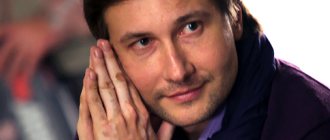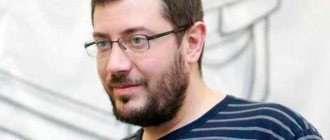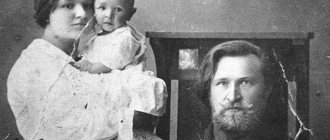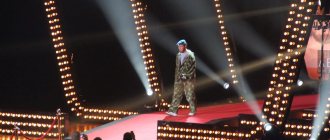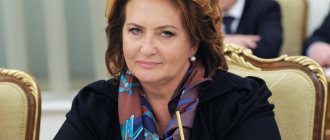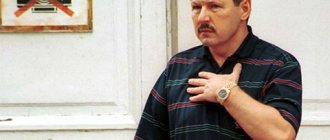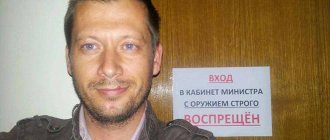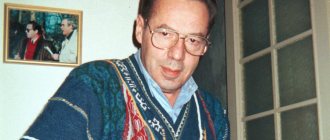370
Lebedev Alexander Evgenievich
Lebedev Alexander Evgenievich
- Russian entrepreneur, public and political figure, writer. Chairman of the Board of Directors of CJSC National Reserve Corporation, former deputy of the State Duma. Deputy of the Slobodskaya District Duma (from 2011 to 2014). Owner of the British online publication Independent and the television channel London Live. Majority owner of the Evening Standard newspaper. The largest private shareholder and investor of Novaya Gazeta. Member of the Council on Foreign and Defense Policy.
Biography of Alexander Lebedev
Alexander Evgenievich Lebedev is a major entrepreneur, banker, beneficial owner of the financial and industrial holding National Reserve Corporation, which includes about a hundred enterprises in various sectors of the economy, media tycoon, owner of a large stake in Novaya Gazeta, the British TV channel London Live, the influential publications Evening Standard, Independent, I Newspaper and other media resources. Previously, a people's deputy and KGB officer.
Lebedev Alexander Evgenievich
According to Forbes, he amassed a billion-dollar fortune in the late 1990s through transactions with commercial and government debt. In 2006, his capital reached $3.7 billion, but subsequently the entrepreneur lost most of his assets. In 2015, his assets were valued at $400 million.
Career and business activities
Lebedev’s first workplace, as mentioned above, was the Institute of Economics of the World Social System at the Academy of Sciences of the Soviet Union. Then, as you know, he began working for the KGB in the first directorate - it was responsible for foreign intelligence.
After retirement, he retrained as a businessman. Initially, he was a representative of the Swiss bank “Company Financier Tradition” in the territory of the former USSR.
In 1993, he founded the Russian Investment and Financial Company and himself headed his brainchild. Two years later, under his leadership, RIFK acquired the “national reserve bank”, and the place of one of the founders was offered to Gazprom.
In 1999, Lebedev initiated, albeit together with the heads of the largest Russian banks and enterprises, the creation of the National Investment Council. The main task of NIS was to create a favorable climate for investment in Russia, including foreign ones. Lebedev became chairman of the board of trustees of the association. In 2001, the burden of chairmanship was removed from him by former USSR President Mikhail Gorbachev, whom the media at one time called one of the creators of NIS, and Lebedev became president of the company.
Alexander Evgenievich did not forget science. So in October 2000, he became a candidate of economic sciences, after defending his thesis on the topic “Problems of Russia’s external debt.” The defense took place at the Institute of International, Economic and Political Studies of the Russian Academy of Sciences. Three years later, here he defended his doctorate on the topic “Financial globalization in the context of problems of global, regional and national (Russian) development.”
Political career
Simultaneously with his studies in business and science, Lebedev went into politics. His first major attempt to declare himself as a politician was made in 2003, when he ran for the post of mayor of the capital. He nominated himself as a self-nominated candidate, and during the election campaign he became a member of the Rodina party, which he began to support. Despite the fact that Lebedev’s election program contained a promise to double the income of the city treasury and the capital’s residents themselves, he lost by a huge margin to the then head of the capital, Luzhkov (12.35 percent of the votes against 72.82). But as our hero said, these elections were only a test of one’s strength in politics.
At the same elections, he noticed the “media” inequality of candidates for the mayoral position. According to Lebedev, this was explained quite simply - Luzhkov at that time was the owner of a TV channel, newspapers and radio, which campaigned for their owner around the clock. This does not count the time allocated to all candidates by the official media.
In the same 2003, Lebedev already participated in the elections to the country’s parliament, as the head of the regional Moscow bloc “Rodina”. As a result of the elections, he became a deputy of the 4th convocation of the State Duma. And if you believe official sources, according to the law, Lebedev left all his positions in the entrepreneurial field and completely focused on his parliamentary work.
Literally immediately after he became a State Duma deputy, Lebedev said goodbye to the Rodina bloc and joined the United Russia faction. The reason, according to deputy Lebedev, was disagreement with the extremist ideas of one of the leaders of Rodina. Who exactly Alexander Evgenievich did not indicate. In the State Duma, he took the post of deputy chairman of the Committee on CIS Affairs, and led a group for cooperation with colleagues from the Ukrainian Rada.
He also did not forget about the defeat from Luzhkov during the mayoral elections, the reason for which, according to Lebedev, was his opponent’s advantage in media capabilities. Therefore, together with Gorbachev, he acquired a stake in Novaya Gazeta.
Personal life
At the moment, Lebedev is married for the second time. From his first wife, Natalya, he has a son, Evgeniy (born in 1980), but he separated from her in 1998. The son is already an adult and has followed in his father’s footsteps - he has become an economist. Now he works as an executive director of his father's English media resources.
The second chosen one of the millionaires was Elena Perminova, a model. She is 27 years younger than him. Lebedev has three children from her: Nikita (2009), Egor (2011), Arina (2014).
At one time, the media published some rumors about the oligarch’s second wife. At a young age (17 years old), she was detained by law enforcement agencies for drug distribution, and the girl faced a prison sentence of up to 6 years. However, according to legend, deputy Lebedev saved her from this, to whom the girl’s father turned for help. Whether this is true or just a fabrication of journalists, we don’t know.
Childhood and family of Alexander Lebedev
The future oligarch was born on December 16, 1959 in Moscow. The head of the family, Evgeny Nikolaevich Lebedev, was a well-known optical physicist in professional circles, a professor at the Moscow Higher Technical University. Bauman. Mom, Maria Sergeevna, taught students a foreign language at MGIMO.
Alexander Lebedev graduated from MGIMO
The parents gave their son an excellent education. At first he studied at school No. 17 with an English bias, then at the economics department of the Institute of International Relations. In 1982, upon completion of his studies, he began working at the academic Institute of Economics of the World Social System.
Author: Alexander BOYARSKY 05/02/2011
Review of the non-fictional biography of oligarch Alexander Lebedev This book was brought to the editorial office by a courier along with a covering letter without a return address. Printed on expensive creme brulee-colored paper was an invitation from a certain administration of the Eden Hotel to “get acquainted” with the novel “666. Birth of the Beast." The book publisher thought through the marketing move - it is unlikely that he would have purchased this work with his own money. Thick (twice as thick as usual) and funny (a scarecrow on the cover), this book was also written by an author with the “computer-Juche” pseudonym I.M. Ho. And the blurb said that under the hard cover of the 666-page novel, “erotic obsession and religious revelation mixed in an intoxicating cocktail.” In a word, mystical bed stuff that fills bookstore shelves. But, quickly leafing through the book, I realized that this was not an ordinary tabloid novel, but a message to the top leadership of Russia. A message from a person who is familiar with the secrets of the political kitchen and belongs to the country's business elite. However, calculating it turned out to be not at all difficult. The English abbreviation IMHO (In My Humble Opinion) is often used in chats or on social networks, replacing the introductory word “in my opinion” or “in my opinion”. Sometimes this abbreviation is deciphered as “in my terrible opinion” (In My Horrible Opinion). The Russian-speaking part of the World Wide Web has reinterpreted IMHO in its own way - “I have an Opinion, Although It’s Erroneous.” The microblog of Ivan Matveevich Ho (I_M_HO) immediately appeared on Twitter. Here the name of Artyom Artyomov was mentioned as the real author of the book “666”. This version was confirmed by a blog called “Notes of a Satrap” on LiveJournal (LJ), where the blogger artyomov calls his wife after Tirli, to whom the novel is dedicated. In a note made on February 19, 2011, “Artemov the satrap” posted a video in which he accompanies the Russian oligarch Alexander Lebedev for interrogation at the Moscow Main Internal Affairs Directorate. In the zhezhist community “Politics in Russia” (ru_politics), blogger kolobok1973 made the following entry on August 16, 2007: “We have known Artem for 15 years, since 1992, he has been in politics for a very long time. At that time he also worked with Aksyuchits and Konstantinov in the National Salvation Front, in various political organizations of a patriotic nature (“Derzhava”, etc.) For many years he was Zatulin’s press secretary, now he works with Lebedev.” Kolobok1973 is the pseudonym of Daria Mitina, who in 1996 was elected to the State Duma on the lists of the Communist Party of the Russian Federation and became the youngest deputy. So I “figured out” that Artyom Artyomov is the author of the book “666” and the press secretary of the famous businessman, a celestial being on the Forbes magazine list of billionaires, Alexander Lebedev. The oligarch also turned out to be a regular in the virtual world, an active zhezhist, regularly writing on his own blog, called “Capitalist-Idealist.” 10 years of shocking Due to his own ostentatious openness, it would seem that everything is known about Lebedev. Born in Moscow in 1959. He studied in the same class with another future oligarch Alexander Mamut. Graduated from MGIMO (1982) and the Red Banner Institute of the KGB of the USSR (1984). In 1992, having risen to the rank of lieutenant colonel, he completed his career in the Foreign Intelligence Service (at the Foreign Intelligence Service, in particular, he dealt with issues of preventing capital flight abroad). At that time, Andrei Kostin, now the head of Vneshtorgbank, served as the assistant to the ambassador in London on economic issues. In London, at one of the social events, Lebedev was introduced to the president of the Imperial Bank, Sergei Rodionov. Upon his retirement, Lebedev went into business, creating the Russian Investment and Financial Company (RIFK). Lebedev’s start in business was given by his ambassadorial connections and knowledge of the rules of the game in Western financial markets, rare at that time. In the early 1990s, money in Russia was literally made out of thin air. One of the common and very popular methods in the banking environment was the so-called sale of Soviet debts. In order to get at least something, creditors (especially foreigners) agreed to obviously unfavorable conditions. They sold their bills at a discount that sometimes reached a quarter of the amount. In turn, businessmen with connections to the Ministry of Finance and the government bought these obligations cheaply and immediately presented them for payment, but at full price. By a happy coincidence, there was always money in the budget for these operations... It was under this scheme that Lebedev and his classmate Mamut earned their first millions. Meeting Deputy Finance Minister Andrei Vavilov immediately expanded Lebedev’s opportunities. In particular, Vavilov introduced his new friend to the head of Gazprom, Rem Vyakhirev. And in 1995, RIFK, on shares with Gazprom, acquired the National Reserve Bank (NRB). The bank immediately took off in terms of the volume of money, although to a large extent it was about virtual money in accounts, and not about cash. NRB received part of Gazprom’s operations for servicing and became an active player in the market for “working” with government debt. At the same time, Lebedev is passionately involved in politics. One can assume that his political credo is rather banal - any party is good as long as it suits Lebedev’s business. Therefore, the list of parties in which he was a member is impressive. In April 1997, Lebedev was elected a member of the political council of the “Our Home is Russia” (NDR) movement of Viktor Chernomyrdin. In August of the same year, he became deputy chairman of the Kedr Ecological Party. In 1999, he stopped sponsoring Kedr. Lebedev’s impulsive, sometimes bordering on extravagant, actions “to the public” became his calling card. In 2003, he headed the Moscow list of the national-patriotic Rodina bloc, was elected to the State Duma, and in December of the same year moved to United Russia. In June 2007 he joined the A Just Russia party, and a year later, in April 2008, he was expelled from A Just Russia for “anti-party activities.” Perhaps Lebedev set a record for the number of party signs, which no one has been able to beat for a long time. Outwardly chaotic party life did not allow him to consolidate his status as a politician. The oligarch could not remain without the attention of television cameras and constantly came up with informational reasons, irritating his party comrades. The oligarch discovered his gift for writing in the new millennium. After 2003, he published two books - “100 answers to Muscovites” and “Diagnosis... or collecting votes under the gun of city authorities.” The first is built on the question-answer principle and begins with the sacramental “Why are housing prices in Moscow so high?” In the second book, the theses about “price collusion” were supplemented with the cry “Moscow is being choked by traffic jams.” Thus, Lebedev managed to promote his new business in the meantime - affordable housing from low-rise buildings, the production of which is carried out by one of his companies. And the billionaire deputy openly let himself down with traffic jams. Lebedev published the newspaper “Probka”, which was distributed among drivers stuck in traffic jams, and where he actively proposed his plans for solving the city’s transport problems. Luzhkov decided to slap his opponent back, and the mayor's office invited the deputy to head the Department of Strategic Development of Highways in 2007. The businessman somehow vaguely refused such an honor. In 2009, Lebedev participated in the elections for the post of mayor of the resort city of Sochi. Ballerina Anastasia Volochkova ran for the same post. The Sochi Election Commission canceled their registration, and then, as a sign of protest, Volochkova called on residents to tie pink ribbons to the antennas of their cars. Sochi residents remember the ballerina and the banker with these ribbons. Almost 15 years of active political throwing, more than 10 years of shocking behavior in the public space, and still even the most loyal politicians do not talk about Lebedev as a serious figure. At best, he is awarded the title of “Gorbachev’s friend.” It seems that this is one of the sore spots of our ambitious hero, carefully hidden from prying eyes, and the reason for his passion for various kinds of media projects, which include the publication of the book “666”. But our oligarch is unlikely to ever shed the stigma of being a flighty political rake. Perhaps Alexander Lebedev’s diverse and complicated business forces him to continue to seek cover in politics? It is no coincidence that on March 14, 2011, Lebedev was elected as a deputy of the Slobodskaya District Duma of the Kirov Region of the fourth convocation in the Ilyinsky four-mandate electoral district No. 5. Why does the oligarch need the Slobodskaya district? Political scientists explain it simply: now, according to the new rules, you can only get into the Federation Council with a regional deputy mandate. And the inviolable status of a senator will always be useful to the oligarch. Today, Lebedev, in addition to NRB, owns the National Land Company (potato producer), Energobank (Ukraine), construction (construction of country real estate), and the real estate agency "ECO-real estate". Alexander Evgenievich owns the British The Evening Standard and The Independent, and he also owns a stake in Novaya Gazeta. Lebedev heads the Charitable Reserve Fund and participates in the work of the Gorbachev Foundation and the Raisa Gorbacheva Foundation. In the Forbes list of the richest businessmen in Russia for 2010, the businessman took an honorable 34th place with a fortune of $2 billion. “Androids from the stamping shop” As far as one can judge from a quick reading of the book “666. The Birth of the Beast,” the storylines were drawn by the press secretary, and the oligarch himself assembled and filled the characters with inner meaning. Strange, but the billionaire saved on the editor. The text is replete with graphomaniacal blunders like “the gentlemen decided to introduce a fresh masculine spirit into their girl group” or “two other nymphs began to scream inhumanly.” The narration is told on behalf of a 40-year-old PR specialist - an election consultant, who, most likely, is “copied” from Artyom Artyomov himself. The description of one of the book’s heroines, Rimma Mandrova, is striking, part of whose life story almost coincides with the biography of ex-deputy Daria Mitina. (Artyomov and Mitina have known each other for more than 15 years, as mentioned above). In the 3rd chapter of the book, for example, it says: “She was nicknamed “Deputa” fifteen years ago, when she just flew into the orderly ranks of parliamentarians on the list of the Communist Party of the Russian Federation, striking everyone with her youth - at the time of her election, the fiery Bolshevik was barely twenty-two years old. <…> She entered into an intimate relationship with every male person she liked who came into her field of vision <…> Her top list included ministers, ambassadors of foreign countries, editors-in-chief of newspapers, businessmen and TV presenters.” The characters in the novel are Kremlin officials, government members, deputies, oligarchs and their servants. Some are given under their own names, for example, Dmitry Medvedev, Vladimir Putin, deputy. head of the presidential administration Vladislav Surkov, Anatoly Chubais, Yuri Luzhkov, Boris Gryzlov, Yulia Tymoshenko and businessman Evgeny Chichvarkin. Others are slightly changed - Mikhail Zukhrabov, Tatyana Goblikova, oligarch Mikhail Porokhov, deputy Finkelstein and, finally, “capitalist-idealist Alexander Lebedin.” “Capitalist-idealist” is the name of the blog on LiveJournal by Alexander Lebedev himself. In the novel’s chapter of the same name, the “true” biography of the oligarch is conveyed with the meticulousness of a newspaperman. True, in a very condensed form, but we will return to his biography. It is curious that the personal driver of the PR hero is called Mikhail Sergeevich - like the president of the Gorbachev Foundation. However, at the very beginning the author warns that “all characters and circumstances in this book are fictitious.” From this we can conclude that the descriptions, for example, of the State Duma and United Russia are not fictitious and express the author’s point of view: “Only after spending an incredible amount of money and finding themselves in the “circle of the chosen”, they suddenly realized with horror that they were in the ordinary a viper with the morals and routine of some research institute. That here, too, there is its own color differentiation of pants - its own party committees, its own heads of departments and deputy directors - chairmen of parliamentary committees and vice-speakers. <…> Money was carried in suitcases, and kickbacks were paid in villages and “dolyans”. Of course, Zhirinovsky worked most masterly of all. <…> However, with the advent of Putin, the Duma lost all meaning even for suckers. The center of lawmaking moved to the Kremlin and the White House, and parliament turned into a setting for “sovereign democracy.” The meeting room was filled with United Russia members - strong-assed, pot-bellied men in gray jackets, with gray faces, and provincial women of the same build and year of manufacture. Lobbyists have left the State Duma - what's the point of talking to androids from the stamping shop who vote on a signal from the government box? Ordinary parliamentarians could only earn money from custom requests in criminal cases. And even those, as a rule, were immediately thrown into the trash by prosecutors. Thus, the deputy corps turned into gray biomass.” About the highest authority in the country: “The country is ruled by a clan. The clan has a founder who is now sitting on Krasnopresnenskaya embankment, and will soon be back in the Kremlin. There is a kind of Politburo around him. It, for the most part, consists of former members of the Ozero cooperative in the Leningrad region and comrades who joined them. This Politburo has the main task of ensuring its power until the end of time...” And about the people: “Drunk men buying burnt water for their grandmothers’ pensions. Incest. Illegal darkness... Is this the Russian gene pool?!” The oligarch's revenge The choice of minor characters in the novel cannot be called accidental. Under fictitious but easily guessable names hide people who, although they do not belong to the circle of the powerful, probably once seriously annoyed Lebedev with something. Now the “idealist Lebedin” was finally able to wash away personal grievances by giving offensive characterizations. One of these characters is Lenya Kruglyakov, who in the book is called “a snoop on Luzhkov’s press secretary Tsoi.” If his prototype is Moscow journalist Leonid Krutakov, then we can confidently say that he appears in the book at the behest of the oligarch himself. After all, it was Krutakov who wrote the sensational article “Our Home is Gazprom,” published in Moskovsky Komsomolets on June 3, 1999. The journalist claimed that the National Reserve Bank was at the center of mutual settlement schemes between Gazprom and the Ministry of Finance, through which budget money intended for Yeltsin’s election campaign and the promotion of “Our Home – Russia” was “laundered.” This is also where the “historic” copier box came from (the money for it was delivered to the White House by NRB employee Boris Lavrov). Valery Streletsky, who was the head of department “P” of the Security Service of the President of the Russian Federation in 1994-96, recalled: “Why did Lebedev’s bank end up in that election “pool” of banks? In my opinion, the answer is indisputable - because Lebedev had stable connections abroad. In addition, by that time he turned out to be a confidant of the Chernomyrdin team. The banker was very close to this clan, and therefore these elections could not have happened without him. I do not rule out that Lebedev himself was able to make good money in those elections. Leonid Krutakov wrote that the editorial office of MK received the estimate for financing the NDR. Just one meeting between Viktor Chernomyrdin and a famous football club cost the budget 200 million rubles. One name appeared on the income statement - the National Reserve Bank. The article continued: “We have every reason to say that during the election race, the NRB regularly received funding from the state treasury. For this purpose, a scheme of mutual settlements was developed between Gazprom and the state budget, allowing up to $50 million to be “washed” in one second.” After this, how can you not proudly call yourself an “idealist capitalist” on the Internet? “The once sensational deal with Ukrainian government bonds issued to pay off debts for the supply of our gas also brought considerable profit. By government order 623-r dated April 17, 1996, Gazprom was allowed to compensate from the budget for gas supplies against the intergovernmental agreement on the construction of the Yamburg gas pipeline by offsetting with Ukrainian bonds. The compensation was supposed to be $800 million. Gazprom contributed Ukrainian bonds to the budget for a nominal amount of 800 million, and the real value of these bonds at that time did not exceed 30 percent. At the same time, Gazprom received tax exemptions for all 800 million, and half of the bonds returned to Gazprom under an intergovernmental agreement. Thus, there was double funding from the state budget in the amount of $400 million, and in reality the gas concern received not eight hundred million in compensation, but about one billion.” Since then, the “capitalist-idealist” has disliked the journalist Krutakov, but has become deeply attached to the hryvnia and Yulia Tymoshenko. For more than 10 years in Ukraine, the oligarch created a powerful system covering all interesting sectors - tourism, hotel business and others... Alexander Lebedev was one of the few Russian entrepreneurs who supported the “orange revolution”. “I have many friends in the team of Viktor Yushchenko,” Lebedev said in the days of Orange Katavasia. The scandal-scandal and a spoon in the head of the “identifiers-identists”, dedicated to himself, “Lebedin” briefly, in several lines, talks only about three of the many of his dubious business operations, including the famous “Xerox box”. I would like to expel the falsehood and the stepness of the main characters, confirming realism on the pages of the novel. By the beginning of the “zero”, the head of the NRB had an ambiguous reputation among colleagues in the workshop due to his irreconcilable war with the French bank Credit Agricole Indosuez (“Terkhrikol Indo-Essue”, which were involved in the presidents of Russia and France, as well as ambitious projects like exchanging shares of RAO "UES of Russia" for debts of the former USSR Parisian club or restoration of the livestock of breeding cattle in Russia. They say that Lebedev also planned to “drain” the Rybinsk reservoir. It all started in 1998, in the year of default, when the French bank lost about $ 980 million in the Russian market. Among the clients with whom the credit worked were Sberbank, Vneshotorgbank, Russian Credit, Autobank. With them, the French managed to solve their problems amicably. Half of the amount fell on state treasury obligations (GKO), and about 500 million dollars “burned” on the so -called currency futures contracts. The French protested in the New York court 10 out of 14 disputed contracts, the cost of which was $ 110 million. And they received the full satisfaction of their requirements in the USA. But the NRB defended the Moscow Arbitration Court. However, at home, “Terkhrikol Indo -Essuez” turned out to be more agile, and at his request in Belgium and Switzerland, accounts and bonds of the NRC worth more than $ 500 million were arrested. In response, the French and American NRB lawyers managed to arrest $ 75 million belonging to the “Terkhikol Indo -Essuez” on the accounts of the Bank of France itself. This victory brought a banking conflict to a new level, since more than half of the country's population was more than half of the country's population. The French were actually suspected of falsification of documents, deception of customers. Therefore, the leaders of the bank went to an unprecedented step, allowing Russian investigators to their holy saints. They also filed a lawsuit against the Russian judicial system in the European Court of Human Rights. A scandal with a French bank is a very indicative story. On the one hand, it belongs to the list of troubles of the NRB that fell on the bank in the late 90s, on the other, it is a bright example of how Lebedev fiercely fights for his blood and eventually succeeds where the rest of the Russian financial giants prefer to pay quietly and stay in the shade. It turns out that the reputation losses did not bother him: he always acted on the principle - the more hype around his name, the better. Lebedev’s wings, the author of the novel about the misadventures of the oligarch related to the aviation business, which continues at this time, did not say a word. If in the 90s from Aeroflot they pumped all the currency revenue to foreign bank accounts, then in the 2000s for Lebedev the company became, on the contrary, a kind of drain tank, into which he tried to shove his own products. In 1999, the oligarch received an order from Aeroflot for the supply of six IL-96-300 aircraft, despite the fact that their cost, according to experts, exceeded the market and was comparable with the cost of Boeing. The deal allowed Aeroflot to receive exemption from VAT and customs payments for imported liners. Later, the “Idealist Capitalist” bought a 26-percent package of Aeroflot shares from Millhouse Capital, an investment company representing the interests of Roman Abramovich. (By that time, Alexander Lebedev was already the owner of 46% of Ilyushin Finance Ko and the manager of a 57% of the shares of the Voronezh Joint -Stock Aircraft Society.) If, at first, Lebedev’s conversations about the revival of domestic aircraft industry perceived with enthusiasm (even entrusted to make the presidential board), then soon Even these unsteady illusions were dispelled in the roar of Ilov engines. As an entrepreneur, the state persuaded the state to prove it to its liners, in the Kremlin and the White House the banker was no longer complaining with an experienced suspicious warmth. The former Prime Minister Mikhail Kasyanov went to political peace in the train of corruption scandals, and the new one-Mikhail Fradkov, also a former intelligence officer, apparently decided not to substitute a government wing to dive him. Even the partial possession of Lebedev, say, Voronezh production, led to the fact that the billing fee soon found out: the plant brings losses. More precisely, not, not so, not quite so. It brings losses to the state, the co -owner of the plant. And Lebedev? When the state became part of the shareholders of Ilyushin Finance Ko, three budget tranches were made in the authorized capital of the company with a total of 2.52 billion rubles. But at the same time, the Ilyushin shares were located on the market at a price of 59.497 rubles apiece, at a nominal price of 5 rubles. As a result, in the balance sheet of the company, most of the funds from the placement of shares were taken into account as additional, not the authorized capital. With all the ensuing tax troubles. When the transaction mechanism surfaced, a scandal erupted, up to the arrest of shares. In 2003, more than 50% of Ilyushin Finance Co. - that is, the entire non -state package - were arrested. According to the official version, the Prosecutor General’s Office had claims to form a legal entity. According to the assurances of informed sources discovered during the investigation in the case of Ilyushin Finance Co., violations were enough to initiate a criminal case on the fact of fraud in especially large sizes. The hype subsided as soon as Lebedev agreed to sell his share in Aeroflot. "Ilyushinsky scandal" ceased. ... Aeroflot CEO Valery Okulov, previously former Lebedev’s partner, somehow spoke about the style of Lebedev’s communication: “an unmotivated and provoked claim, a screech, and hit.” It can be assumed that such is his business style. “Nevsky is not that” “Then the oligarch left the bank and went to the State Duma, where he became famous for the initiative to ban the gambling business,” the line from the novel “666” ran along the lower edge of the page as a tear, stealing from the cheek. Yes, Alexander Lebedev louder than all in support of the law on the adoption of all gambling points outside the city. And at this time, the Nevskoye lotto lottery was held in St. Petersburg, and the Vedomosti newspaper reported that the actual owner of the lottery is structures close to the national reserve bank. It turned out that the main fighter with the gambling business acted disagreed. Lebedev at first flatly refused to recognize the involvement of companies included in the NRB and even published a letter of reflection in Vedomosti. But here is the deputy. The manager of the St. Petersburg branch of the NRB Mikhail Volkov admitted to involvement in the organization of the lottery. It turned out that Nevsky Lottery CJSC was registered in early 2004, its founders, in addition to the City Hall of the Northern capital, were the NRI and CJSC Group Conti. This painfully hit not only on the reputation of the oligarch, but also made his party comrades densely blush. In an interview with the newspaper “Your Day”, Lebedev had to recognize the connection of the NRC with the draws held in St. Petersburg: “I did not know about this to this day, and the CEO of the bank. This is probably the initiative of the St. Petersburg branch of the NRB. ” It is known that Alexander Lebedev does not trust anyone to the decision of even small operations in his business. It is hard to imagine that the bank branch decided on the lottery without the knowledge of the Moscow boss. Grail's gypsum bowl exiting the novel “666. The birth of the beast ”in a strange way coincided with the next scandal around Lebedev's“ Idealist capitalist ”. By golly, he should be called the scandal capitalist. The idea itself suggests itself that this book, in which real events and people are adjacent to nightmares, alcoholic delirium and narcotic hallucinations, antichrist, apocalyptic paintings and erotic scenes - this book can become a cover for the next multimillion -dollar banking combination. ... On November 2, 2010, when work on a literary and artistic publication ended with the number of booty whiskey, according to the I_M_HO on Twitter, no longer succumbed to the score, armed riot police in masks broke into the Main NRB building on the 60th anniversary of October. Police officers Putano explained that they were conducting investigative actions in connection with the criminal case on theft of the property of the Russian Capital Bank, sanitized with the participation of the NRC in 2008. According to the investigation, the employees of Russian capital, "resorting to the help of the fictitious OJSC" Centralizing ", stole 450 million rubles belonging to the bank." Several hundred documents were seized from the NRB and three people were detained. “In our offices there is a search and the seizure of documents. In addition, people in masks also appeared in other branches of the bank, ”RIA Novosti, spokesman Artyom Artyomov, told RIA Novosti. At the same time, recently, in the best traditions of PR, information appeared that, it turns out, investigators were looking for not financial documents in the NRB office, but ... the manuscript of the novel "666". The novel miraculously managed to save, hiding the flash drive in the double day of the gypsum copy of the Grail bowl. The newspaper controlled by the oligarch suggested that the “special operation” of the FSB of the Russian Federation, which is responsible for the security of the state in the financial field ”and participated, according to the newspaper, in another“ special operation ” - in relation to the Hermitage Capital Foundation, where the late Sergey Magnitsky worked as a lawyer. Immediately the newspaper The Daily Mail wrote that Alexander Lebedev has been actively opposing corruption in Russian business and quoted the words of the oligarch: "The fight against corruption should be the same as the struggle against the apartheid." According to Lebedev, Russian capital was interesting to him by his client base and a developed branch network. The transaction was made in 2008 for a symbolic amount of 5 thousand rubles. In addition, the bank was promised to “sanitize”, as it was brought “to the pen” with very, very strange operations. The government gave the official order of the NRI to reorganize Russian capital. On the NRB accounts, a deposit of the Central Bank of $ 300 million was placed. The press reported with reference to the Deputy General Director of the Deposit Insurance Agency (DIA) Valery Miroshnikov that when checking the Russian Capital bank, fictitious assets were discovered in the amount of 3.7 billion rubles. An example was the acquisition by the bank of the stakes of a dummy company, the papers of which were allegedly quoted in the market. In connection with the detection of fictitious assets, the DIA promised to contact law enforcement agencies. Perhaps the “political thriller, social grotesque and a fantastic action movie” “idealist-catapilist” was published very on time. The novel, most likely, is called upon to play the role of a smoke curtain, a false attack or other “special equipment” from the arsenal of the ex-intelligence in order to distract attention from “Russian capital”, which is located in the field of Lebedev’s interests. the Litvinenko Lavra, The Daily Telegraph, wrote that the Russian businessman and ex-deputy of the State Duma Alexander Lebedev "probably dies, since the content of mercury in his blood exceeds the norm by 14 times." Gradually, mercury can affect the nervous system and brain, which will lead to a loss of memory, the correspondent of the publication Kate Weinberg noted. When asked by the journalist, does he think that the Kremlin is behind poisoning, Lebedev replied that poisoning is not related to politics: “This is one of his own money. Old story". According to Lebedev, he faced threats from a number of Russian state structures, including the FSB. The businessman was strongly recommended to leave the country. Otherwise, Lebedev risks parting life under mysterious circumstances. “They told me - do not cross the line,” Lebedev said in an interview with The Daily Telegraph. According to him, the capture of his bank with armed employees of the special services was a warning that greatly resembles the tactics of the Sicilian mafia clan "Koza Nostra". “They did not arrest me because it was a demonstration of power. It’s like a goat of the nostraus - at first they send you a rotten fish wrapped in a newspaper. ” A press release of the Dream House "Paradise" ... I propose another, in my opinion, a more successful finale for the book "666. The birth of the beast. " “During the first act, Alexander Evgenievich Lebedev (the character is fictional. - Ed.) Hunted the villain throughout the scene, but it was not easy to catch him - the Antichrist knew how to pretend to prefer other actors or surround himself with a fog. In parallel, the spy intrigue also developed a love, which ended with a naturalistic scene. Lebedin dropped a little cocoon and a cape, put on a pack and pointe. And, pulling the mask, in an instant turned into Anastasia Volochkova. The ballerina at the tips of the toes gracefully entered the forefront and invited the Sochi to tie pink ribbons to the antennas of their cars. "As a sign of solidarity." “... In any other decent country, it would have long been president and would dance on the best world summites,” the oligarch said coquettishly.
Career of Alexander Lebedev
In 1983, he was offered to join the ranks of state security officers. In 1984, Alexander graduated from the Red Banner Institute. Yu. Andropov KGB USSR. As an undercover intelligence officer, he held various positions in Soviet diplomatic missions abroad. Since 1987, Alexander lived and worked in the capital of Foggy Albion, which allowed him to make many useful contacts.
Alexander Lebedev worked in London at the beginning of his career
A successful diplomat, intelligence officer, part of the British establishment, acquired useful connections in business circles, met with Mikhail Prokhorov, Oleg Boyko, Vladimir Potanin, Andrei Kostin.
In 1991, a special services officer with the rank of KGB colonel resigned and began entrepreneurial activity. From 1992 to 1993, he was a representative of the banking institution Kompani Finansjer Tradison in the CIS.
In 1993, an ex-special services agent, in partnership with former colleagues, established the Russian Investment and Financial Company, included in the structure of the Imperial Bank, within which he specialized in the restructuring of external debts of the Russian Federation. In 1995, RIFK bought out the National Reserve Bank. Among its founders and main shareholders was Gazprom. In 1999, Lebedev initiated the creation and headed the National Investment Council.
Banker Hunter
The last time such an extraordinary figure as Alexander Evgenievich Lebedev was presented on the pages of our newspaper was almost 14 years ago, in November 2003, when he put forward his candidacy for the election of mayor of Moscow against Yuri Luzhkov. Since then, a lot of water has flowed under the winding channels of time, and very fast water, it must be said - in fact, not one, but two historical eras have changed: “pre-crisis”, 2003-2008, and “pre-Crimean”, 2009-2014. In connection with the publication of his autobiographical book “The Hunt for a Banker,” Alexander Lebedev agreed to a conversation with the deputy editor-in-chief of the newspaper “Zavtra” Andrei Fefelov, which we bring to the attention of our readers.
Andrey FEFELOV. Alexander Evgenievich, congratulations on the publication of your book “The Hunt for the Banker.” As far as I know, in this book, in addition to the very interesting and adventurous facts of your biography, there is a large section that is related to the activities of Russian and world banks.
As you know, the banking system is a thing in itself. Few people understand what is happening there. I watched several of your videos on YouTube, where you say that there are very few specialists who could understand the banking system, especially its criminal schemes, and these few specialists are located inside the system. There are practically no such specialists in law enforcement agencies and surveillance systems. I remember that, with a certain amount of irony, you even offered yourself the role of such a general banking inquisitor... However, there is now a series of scandals surrounding Russian banks. The largest banks are being reorganized, and huge amounts of money continue to slip away into the unknown. There is a feeling that the Russian state has no answer to these processes. Is it so?
Alexander LEBEDEV.
No, the Russian state gives a partial answer. In any case, over the past few years, about 500 licenses have been taken away from banks from which money has already been stolen. In this sense, we are probably already finishing getting sick. Approximately $150 billion of client money was removed from the banking system. Today they are hidden abroad - located in several dozen funds, banks, and offshore jurisdictions. The West protects both this money and its beneficiaries very well. The Russian state lacks a policy to return this money. Supervision as such is no longer relevant.
Andrey FEFELOV. Is it possible to get this money back?
Alexander LEBEDEV.
Over the past ten years, Americans have shaken out $330 billion from eleven non-American banks out of court. Their claims were based on three grounds: tax evaders, sanctions violations and the so-called “bad mortgage crisis.” These claims were presented to the banks by the prosecutor's office, the Ministry of Finance, and ordinary lawyers. It was a huge scam that resulted in all the banks settling out of court, returning $330 billion to the Americans. We want to return only 150 billion. I don’t understand how we are worse than the Americans. We can't call the ambassador of an offshore jurisdiction? We can’t call bank representatives to the prosecutor’s office? What's stopping us? In my opinion, all our authorities need to unite. It is necessary that this should not only be done by the prosecutor’s office as a coordinating body on legislation. The Ministry of Foreign Affairs, the Ministry of Finance, the Ministry of Economic Development, the Government, the RT TV channel, and finally (let them make films about these bankers) must get involved. Through joint efforts it will be possible not only to return the stolen goods, but also to imprison the thieves themselves. Moreover, they are not hiding anywhere. Everyone knows where they live: in London or Monaco. And there are not many of them: in Monaco, only about fifty people live on 200 hectares, and another 150 people live in London.
Andrey FEFELOV. There is a feeling that they are under the protection of some unknown structure.
Alexander LEBEDEV.
This is the most important question: does the Kremlin have anything to do with the fact that it was possible to steal banks for ten years with impunity? In my book I answer: no, it does not. There was very weak, almost no banking supervision, there was a “roof” in the FSB and the Ministry of Internal Affairs. Colonel Zakharchenko, who was found with 300 million dollars in cash and about 500 million in a Swiss bank, was part of that very “roof”. Besides him, there were several other generals. Last year, the Kremlin fired all these generals with a wolf ticket.
Andrey FEFELOV. If, for example, a serial killer escapes abroad, he is automatically reported to Interpol. How are people who stole sums comparable to the budget of entire regions better than these serial killers? Why aren't they given out?
Alexander LEBEDEV.
The best Western lawyers are at their service. For a lot of money they provide them with political asylum. This is a huge system in the West, employing hundreds of thousands of people. Another thing is that I was unable to discover the beneficial politicians in this system. Macron, for example, worked at the Rothschild bank; his sudden appearance on the political Olympus raises suspicions, but there is no evidence. I personally spoke with all the prime ministers, including the Prime Minister of the United Kingdom Theresa May. All of them simply do not know that every year a trillion dollars are stolen from various peripheries. In every country in Latin America, Africa, Russia, China, all this money migrates to the same quiet and calm haven, formed from several dozen offshore jurisdictions, large banks and funds. Of course, when we talk about tens of trillions of dollars, we understand that this cannot happen without influential politicians. About $50 trillion has been accumulated in offshore jurisdictions over the past 15-20 years. This is almost global GDP for the year.
Why have I stopped criticizing the Kremlin lately? Because, having studied the Western political model, I realized: it has finally fallen victim to this dirty money. The Western political class and judicial system have deteriorated, the electoral system has deteriorated catastrophically, and the mass media system has become almost entirely corrupt.
I am a Doctor of Economics, a person who had a business in Germany, has a business in England, in the States, in France, in China, in Russia. Over the years of working in various countries of the world, I realized that our political system, unlike the West, is not hypocritical. Yes, we have a bad judicial system. For example, I lost 28 state courts, since our court is not objective. But, looking at the West, their morals, I come to the conclusion that I do not have a moral platform for criticizing the Kremlin.
Andrey FEFELOV. Meanwhile, the Western offshore system also has its representative offices in Russia. For example, I heard that even our own Central Bank is actually affiliated to a greater extent with international financial organizations than with our government and president.
Alexander LEBEDEV.
Most likely, for a long time the Central Bank was the main roof of the FSB, which covered the transfer of this money to the West. Under Nabiullina, the situation has changed, but, unfortunately, there is a serious question about opening these stolen funds - the scale is colossal, from five to ten billion dollars. Thank God that in the last couple of months the Central Bank has at least started talking about what it will ask of shareholders. However, there are no real, confident steps yet. Therefore, I would not look for the puppeteers of the world behind the scenes in the Russian Federation. The Kremlin was simply divorced.
Andrey FEFELOV. But someone did a scam?
Alexander LEBEDEV.
Probably the liberals, or rather the force that is commonly called that. They were the big supporters of all these political figures in the West. In fact, the problem, which I call “third colonialism,” is colossal. This is a much smarter colonialism than the previous two. There is no need to send armies, there is no need to risk your life - you just need to pump out a trillion dollars every year. This is an established fact, and everyone is silent about it!
Andrey FEFELOV. If this is as you say, then stopping this outflow will lead to wild obstruction on the part of those forces that are withdrawing this money.
Alexander LEBEDEV.
So what? We know where the beneficiary people are who stole this money. We have all the evidence that this money was stolen from 1200 banks. I didn’t publish it in the book, but I have a table that shows all the organizations in which this money is located. Take this data, go to Basel to the Bank for International Settlements, present there all the evidence of how the money was withdrawn. And raise this question at the global level. This is a most interesting agenda.
Andrey FEFELOV. Your book is called "The Hunt for the Banker." Are we talking about a hunt for you or are you hunting for bankers?
Alexander LEBEDEV.
I was hunted for ten years, I investigated it publicly, and the peak of the hunt was the criminal case of Polonsky. Then a few years ago there was a raid on the bank. It had a capital of one and a half billion dollars. I paid all my dividends to Aeroflot, Gazprom, all shares, all mortgage portfolios, sold all real estate and returned all the money to clients, demonstrating that there are honest bankers. I think I'm the only one.
Andrey FEFELOV. Having liquidated your business, did you switch to another quality and become a “hunter of bankers” yourself?
Alexander LEBEDEV.
I hope I've moved on. But, of course, I would like the state to support me, so that I would not hunt alone. Recently I published an article on Georgy Bedzhamov (this is Vneshprombank) in my own newspaper. I end my revelations with an appeal to the British: let’s behave archaically and catch the swindler ourselves. Catch the swindler, bring him to me, and I will give you 10 million. In response, the lawyers sent me furious, threatening letters from Bedzhamov, telling me that he was a victim of the regime, that he owned only 0.5% of the shares, that he did not steal anything, and so on. Thus, I achieved my goal, and I saw what line of defense it was. I thought he would go further; threats are unacceptable in England. But no, he never went to court. My newspaper is read by three million people every day. It's a little funny that I'm still doing this alone. Why, for example, not dedicate a special RT report to this, since they have created such an influential channel?
Andrey FEFELOV. It seems to me that now the British are of little interest in people who brought something to them.
Alexander LEBEDEV.
Need to check. I think they will have nowhere to go. The question is not about interest, but about the fundamentals of international law. This money was stolen from Russian legal entities and individuals. I'm not even talking about sanctions and mortgage bonds. The crime here is so obvious that even American tax evaders cannot be compared. This is simply theft in its purest form.
Andrey FEFELOV. I know that you own the chain of healthy food cafes “Petrushka”. What's behind your project? Is this just an attempt to occupy another commercial niche or something else?
Alexander LEBEDEV.
No, what kind of commercial niche is there in cities with up to 30 thousand inhabitants?! In October I will open several cafes in provincial Russian cities. Not on Rublyovka and not in Moscow. If you prepare buckwheat correctly, steam it in the oven in a pot for five hours, and then add cold-pressed linseed oil - it’s so delicious that it just blows your mind. We are used to eating dumplings, cutlets, and borscht. And I want to try to accustom our women to healthy, environmentally friendly Russian food. I am the largest potato producer in the world. This year I harvested 200 thousand tons. I sell normal antioxidant potatoes for 120 rubles.
Andrey FEFELOV. Where are your fields?
Alexander LEBEDEV.
Tula and Bryansk regions. In addition to potatoes, I produce Jerusalem artichoke, soybeans, and corn. In fact, I want to make money from supplies without going through health food chains. Because networks are parasites. If you know a farmer who produces bioorganic food, without pesticides and herbicides, then why do you need a cafe? There are so many immediate benefits: you don’t waste time and don’t go to the store, all the products are fresh, you eat healthy, and besides, you save money.
Andrey FEFELOV. Your idea fully corresponds to the principles of the now popular digital economy, when all connections are quickly and easily built through the Internet.
Alexander LEBEDEV.
Yes, everything is organized through a computer, you order, set a time, we deliver your order to your home.
Andrey FEFELOV. Will you open a cafe in Moscow?
Alexander LEBEDEV.
There will be a bakery in Moscow. It will be in Nelidovo in the Tver region, in Chekhov near Moscow, in Alushta in Crimea. In London, I opened in Hyde Park for three weeks. I fed the English for free. They really liked everything. Who doesn't like it for free? To the question “where can I buy all this?” I answered: go to Crimea, to Alushta.
Andrey FEFELOV. Your project is an example of stunning rationalization that grows through Russian consciousness, Russian society and opposes all this madness that began in the 90s. Eating simple and healthy food is the most rational thing a person can do.
Alexander LEBEDEV.
We just forgot about it. We even forgot how to bake bread. The French bake baguettes, the Italians make ciabattas. In the USSR we baked delicious bread for 15 kopecks. Today, with great difficulty, I found several bakers who are capable of making real bread. Now I will bake about 1000 sourdough loaves a day and make very tasty crackers.
Andrey FEFELOV. Thank you for your efforts, because this matter is directly related to the future of the nation.
Alexander LEBEDEV.
You know, this is gradually becoming part of the culture. Alcoholism is disappearing from society, people are devoting more time and energy to sports. If only Vladimir Vladimirovich had called for people to quit smoking... People would have quit right away! I don't know why he's shy.
Andrey FEFELOV. You once ran for the post of mayor of Moscow, so I think the topic of transforming the capital is close to you. Disgusting advertising has disappeared from the streets, interchanges are being built, and amazing recreational areas are emerging - beautiful, comfortable, modern. And at the same time, we observe colossal hysteria and rejection of all Sobyanin’s initiatives among the intelligentsia, precisely those people who, it would seem, should be primarily satisfied with this Europeanization in the capital.
Alexander LEBEDEV.
The intelligentsia always has complaints about the authorities. This is a normal reaction. And I don’t notice any special barrage of criticism. Indeed, the transformations are amazing. Parks have been laid out all over the city, bicycle paths have been created, and huge sidewalks have been reclaimed from cars. Look at what he did with outdoor advertising. For Luzhkov, outdoor advertising brought nothing to the budget.
Andrey FEFELOV. And yet she was everywhere.
Alexander LEBEDEV.
Now advertising brings the city tens of billions of rubles a year. They say that behind every outdoor billboard there was once a general or colonel of the FSB or the Ministry of Internal Affairs. Well done Sobyanin, he won back! It was not for nothing that I fought Luzhkov. Luzhkovism will remain in history only as disgusting small-town feudalism.
Andrey FEFELOV. You moved in different environments, communicated with government officials in different countries, and traveled a lot. How do you assess the people and the country today?
Alexander LEBEDEV.
I recently visited Artek. What Alexey Kasprzhak has made of Artek on 214 hectares is phenomenal. Any American university, seeing our children's center, will simply die of envy. The highest level! I was shocked. This is the 22nd century - from the point of view of both education and attitude towards children. What about the construction of the Kerch Bridge? This is a great achievement for our country! Look how successfully we are fighting in Syria, despite the machinations of the Americans. Looking at our successes, I am sure that the worst is behind us. We are slowly emerging from the crisis. We'll return the money. I am proud of our country and believe in it.
Subscribe to our channel in Yandex.Zen!
Click “Subscribe to channel” to read “Tomorrow” in the Yandex feed
Political career of Alexander Lebedev
In 2000, Alexander defended his candidate’s dissertation, and after three years, his doctoral dissertation. In 2003, he was nominated for the post of head of the capital's administration and received about 12% of the votes (versus about 75% of the votes for Yuri Luzhkov). According to analysts, this attempt was a means of making a name for itself in big politics.
Banker Alexander Lebedev
During the same period, he became the head of the Rodina bloc, participated in parliamentary elections and was among the deputies of the State Duma of the fourth convocation. Then the parliamentarian left his business projects and posts, including the position of head of the NRB, and concentrated his efforts on fulfilling the tasks of the highest government body. He moved to United Russia, became deputy chairman of the Committee on CIS Affairs, head of the group of deputies for cooperation with the Ukrainian Verkhovna Rada, and a member of the group of Russian delegates to PACE.
In 2006, the politician announced his entry into A Just Russia, and also, in partnership with Gorbachev, acquired a stake in Novaya Gazeta and transferred a package of Aeroflot securities to the foundation of the ex-president’s wife.
In 2007, Alexander Evgenievich took over the management of the National Reserve Corporation, receiving more than half of the company’s shares. In 2008, he was “expelled” from A Just Russia (allegedly due to the dissatisfaction of the Just Russia members in connection with the publication of information about the alleged divorce of Vladimir Putin and his wedding with Alina Kabaeva).
In 2008, it was established, headed by Lebedev. In 2009, he acquired (for a symbolic cost of £1) the United Kingdom tabloid Evening Standard, becoming the first influential British publication to be owned by a Russian media tycoon. In 2010, he also bought the Independent for a similar fee.
Lebedev, Alexander
Banker, billionaire, president of the media holding "New Media"
Banker, billionaire, owner of the National Reserve Corporation, president of the National Investment Council, president of the New Media media holding. Deputy of the Slobodskaya District Duma for the Ilyinsky multi-mandate district No. 5 (Kirov region). In the past, he was a deputy of the State Duma of the fourth convocation: in the elections in 2003 he headed the Moscow regional list of the Rodina bloc, in the same year he left the bloc and joined the United Russia faction, and in 2006 he left it and became an independent deputy , collaborated with the A Just Russia party. Former KGB officer of the USSR. Doctor of Economic Sciences.
Alexander Evgenievich Lebedev was born in Moscow in 1959. In 1977, he entered the Faculty of Economics at MGIMO, and in 1982 he was assigned to the Institute of Economics of the World Socialist System of the USSR Academy of Sciences, where he began writing his PhD thesis (defended in October 2000). Soon he was asked to go to work at the First Main Directorate of the KGB (foreign intelligence), and from 1987 to 1991 Lebedev worked at the USSR Embassy in London.
In 1991, Lebedev retired to the reserve with the rank of lieutenant colonel and went into business. In 1993, he created and headed the Russian Investment and Financial National Reserve Bank. In 1999, together with the heads of large Russian companies and banks, Lebedev initiated the creation of the National Investment Council.
In 2003, Lebedev defended his doctoral dissertation on the topic “Financial globalization in the context of problems of global, regional and national (Russian) development.”
In December 2003, Lebedev ran for mayor of Moscow and won 12.35 percent of the vote, which observers considered a bid for a more serious result in the capital's mayoral elections in 2007. During the elections, Lebedev was supported by the Rodina bloc. At the same time, he took part in the parliamentary elections, heading the Moscow regional list of the Rodina bloc, and became a deputy of the State Duma. After his election, he left the post of president and chairman of the board of the National Reserve Bank. Already on December 20, deputy Lebedev left the Rodina bloc and joined the Duma faction of the United Russia party.
In 2003-2004, Lebedev, as the owner of 30 percent of the shares, was mentioned in the media in connection with the holding of a tender to transfer management of Sheremetyevo International Airport. During the presidential elections in Ukraine at the end of 2004, Lebedev supported the “orange”, counting on preferences for his Ukrainian business, but later repeatedly stated that the new Ukrainian government was putting pressure on him and his business partners. In June 2006, Lebedev intervened in the conflict between residents of the Yuzhnoye Butovo microdistrict and the Moscow authorities, who attempted, on the basis of a court decision, to forcibly relocate residents from their private homes.
In 2007, Lebedev joined the A Just Russia party, led by Speaker of the Federation Council Sergei Mironov. It was reported that he would become number one on the Moscow party list in the State Duma elections, but later information appeared that the businessman, at the request of the Kremlin, would not do this. Indeed, on September 23, 2007, the A Just Russia congress approved the list of candidates for the upcoming State Duma elections, and Lebedev was not on it. In April 2008, Lebedev was removed from the leadership.
At the beginning of June 2008, the New Media media holding was registered on the basis of the Novaya Gazeta publication owned by Lebedev. It was planned that the new holding would include other media assets of the entrepreneur: the Moscow Correspondent newspaper and two radio frequencies. Lebedev took over as president of the new structure. In 2009-2010, he became the owner of the famous British publications Evening Standard and The Independent.
In April 2009, Lebedev was registered as a candidate in the mayoral elections of Sochi. However, in the same month, the Central District Court of Sochi declared the election commission’s decision to register the businessman illegal.
According to media estimates, by 2006, the total assets of Lebedev’s National Reserve Corporation (NRC) exceeded two billion dollars. The main asset of the corporation was called the National Reserve Bank, which has the second largest stake in aviation (about 30 percent) and leasing (IFK, 44 percent) after the state. In addition to the bank, Lebedev's NRC included the National Meat National Mortgage NRB Finance and a number of construction organizations. In January 2010, Aeroflot's board of directors approved the purchase of 25.8 percent of the company's shares from NRK. At the same time, an agreement was reached that NRC would sell 26 percent of IFC shares to VEB. The first part of the deal - the repurchase of 6.3 percent of shares - was closed at the end of February 2010. However, the second one never took place: the Ministry of Economic Development of the Russian Federation opposed VEB’s purchase of IFC shares, after which Lebedev refused to further sell the shares. In December of the same year, during the placement, the businessman sold 4 of his remaining 19 percent shares in Aeroflot.
In February 2011, Lebedev sold 15 percent of NRB shares to his son Evgeniy. The transaction amount was not disclosed.
In March of the same year, Lebedev as a candidate took part in the elections to the Slobodskaya District Duma of the Kirov Region in the Ilyinsky four-mandate district No. 5. Having received just under 40 percent of the vote, he became a deputy of the district duma that same month.
In 2008, Russian Forbes placed Lebedev in 39th place in the ranking of the richest Russians, with his fortune estimated at $3.1 billion.
Lebedev is divorced and has two sons. The entrepreneur enjoys football and swimming.
Full help
(57 kb.)
Personal life of Alexander Lebedev
At the moment, the oligarch is married for the second time. His first wife was the daughter of academician Vladimir Sokolov, Natalya. Their common son, Evgeniy, was born in 1980. In 1998, the marriage broke up. Evgeniy Aleksandrovich became an economist and was the executive director of English media resources owned by his father (Independent, I Newspaper, Evening Standard).
Alexander Lebedev and his son Evgeny
The second choice of the millionaire was model Elena Perminova, who was 27 years younger than her husband. She gave him three children: Nikita (born in 2009), Egor (born in 2011) and Arina (born in 2014).
Alexander Lebedev with his wife and children on vacation
According to media reports, at a young age (17 years old) she was prosecuted on charges of drug distribution. The young girl faced a prison sentence of up to 6 years in prison. However, allegedly thanks to the support of Alexander, a deputy in those years, to whom Lena’s father turned for help, she received a suspended sentence.
Alexander Lebedev and his wife Elena Perminova
The businessman’s main hobbies are swimming and football.
Photos, videos and stories of @ag_lebedev on instagram
Alexander Lebedev
@ag_lebedev
0 Followers | 0 Following | 133 Medias
This profile belongs to Alexander Lebedev with user name ag_lebedev. All photos, stories, videos posted by Alexander Lebedev can be discovered from here.
You can see all media on Instagram related with Alexander Lebedev from here.
Alexander Lebedev is following 0 and followed by 0 users on Instagram. Alexander Lebedev shared 133 media since joining Instagram.
The profile of Alexander Lebedev (@ag_lebedev) is private so the user is not sharing their data with people other than their friends.
@ag_lebedev account is not verified on Instagram.
Alexander Lebedev Instagram User Id is: 4621897960
Show Similar Users
@ag_lebedev
While working out in the @legion_dubna gym before quarantine, we often had arguments that there was not enough equipment, not enough space, etc...
